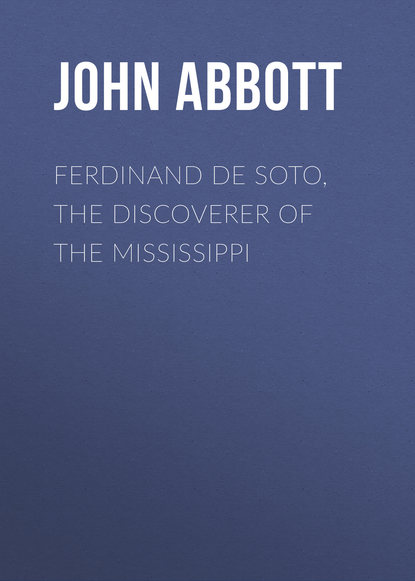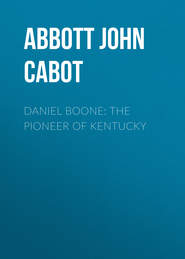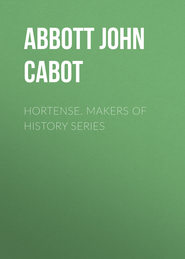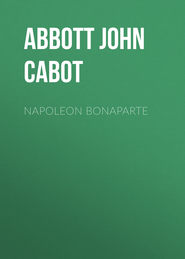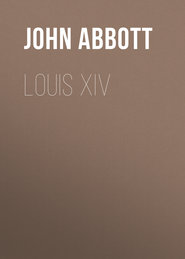По всем вопросам обращайтесь на: info@litportal.ru
(©) 2003-2024.
✖
Ferdinand De Soto, The Discoverer of the Mississippi
Настройки чтения
Размер шрифта
Высота строк
Поля
Don Pedro's eldest daughter, Maria, was engaged to be married to Vasco Nuñez, the very worthy governor who had preceded Don Pedro at Darien, and whom he had so infamously beheaded. She had spent fifteen years in her father's castle in the gloom and tears of this cruel widowhood. Don Pedro bequeathed nearly all his fortune to the endowment of a monastery, over which Maria was appointed abbess. Isabella was left unprovided for. Thus suddenly the relative position of the two lovers was entirely changed. De Soto found himself in possession of large wealth. Isabella was reduced to poverty. We know not where to find, in the annals of history, the record of a more beautiful attachment than that which, during fifteen years of separation, trial, and sorest temptations, had united the hearts of De Soto and Isabella. Their love commenced when they were children, walking hand in hand, and playing in the bowers of Don Pedro's ancestral castle.
De Soto had now attained the age of thirty-five years. Isabella was only a few years younger. When we contemplate her youth, her beauty, the long years of absence, without even a verbal message passing between them, the deadly hostility of her father to the union, and the fact that her hand had been repeatedly solicited by the most wealthy of the Spanish nobility, this fidelity of Isabella to her youthful love is one of the most remarkable in the records of time.
"During the long separation," says Mr. Wilmer, "of these exemplary lovers, many important changes had taken place. Time and sorrow had somewhat dimmed the lustre of Isabella's beauty. But she was still the fairest among ten thousand, and De Soto was too deeply enamored and too justly appreciative to value her the less, because the rose had partially faded from her cheek."
Immediately upon De Soto's return to Spain, as all obstacles to their union were removed, the nuptial ceremony was performed. The voice of fame had already proclaimed De Soto as the real conqueror of Peru. As such, he had not only enriched himself, but had also greatly enriched the Spanish crown. All eyes were fixed upon him. It is said that at once he became the most noted and most popular man in the kingdom. He and his bride were received at the Spanish court with the most flattering marks of distinction. In his style of living he assumed almost regal splendor. He had acquired his money very suddenly, and he lavished it with an unsparing hand. A contemporary annalist writes:
"He kept a steward, a gentleman usher, several pages, a gentleman of the horse, a chamberlain, a footman, and all other officers that the house of a nobleman requires."
One of the most splendid mansions in Seville he selected for his residence, and in less than two years he found that one-half of his princely fortune had melted away. They were two years of adulation, of self-indulgence, of mental intoxication. It was a delirious dream from which he suddenly awoke. Reflection taught him that he must immediately curtail his expenses, and very seriously, or engage in some new enterprise to replenish his wasting purse.
The region of North America called Florida, a territory of undefined and boundless extent, was then attracting much attention as a fresh field for the acquisition of gold and glory. Several expeditions had touched upon the unknown coast, but from various causes had proved entire failures. Eight years before this De Narvaez had visited the country with three hundred adventurers. He found the natives far more warlike than the Peruvians, and the country more difficult of access. De Narvaez himself, and nearly all his band, fell before the fury of the Floridians. Five only escaped. One of these, Cabaca de Vaca, a man of glowing imagination, and who held the pen of a ready writer, wrote a Baron Munchausen account of the expedition. He descanted upon the delicious clime, the luxuriant soil, the populous cities, the architectural splendor of the edifices, and the inexhaustible mines of silver and of gold. There was no one to call his account in question. His extravagant stories were generally believed.
De Soto, who was in the prime of his vigorous manhood, having as yet only attained his thirty-seventh year, read this narrative and pondered these statements with enthusiasm. A couple of years of inaction in his luxurious saloons had inspired him with new zeal for romantic adventure; and to this there was added the powerful motive of the necessity of retrieving his fortunes. He believed that gold could be gathered in Florida, even more abundantly than in Peru; that by the aid of the crown a numerous colony might be established where, under genial skies, every man could be put into possession of broad acres of the most luxuriant soil. And he felt fully confident that his long experience on the isthmus and in Peru, qualified him in the highest degree to be the leader of such an enterprise.
In these views he was sustained by the common sentiment of the whole community. De Soto applied to the king of Spain, the Emperor Charles Fifth, for permission to organize an expedition, at his own expense, for the conquest of Florida. He offered to the crown, as usual for its share, one-fifth of the plunder.
Eagerly the Emperor, who was always in need of money, accepted the proposition, "asking no questions, for conscience sake." The Emperor was very profuse in conferring honors and titles upon his heroic subject. He appointed him governor of the island of Cuba, which he was to make the base of his operations, investing him with almost dictatorial powers as both military and civil governor. He also granted him a private estate in Florida, with the title of marquis, in whatever part of the country he might choose. This magnificent estate was to consist of a region, ninety miles long and forty-five miles wide.
As soon as it was known throughout Spain that De Soto was about to embark on such an enterprise, volunteers began to flock to his standard. He would accept of none but the most vigorous young men, whom he deemed capable of enduring the extremes of toil and hardship. In a few months nine hundred and fifty men were assembled at San Lucar, eager to embark. Many of these were sons of the wealthy nobles, who were thoroughly equipped in splendid style, with costly armor, and accompanied by a train of servants.
Twenty-four ecclesiastics, of various grades, joined the expedition, whose arduous task it was to convert the natives to that religion of the Spaniards which allowed them to rob their houses and their temples, to maltreat their wives and daughters, to set fire to their villages, to hunt them down with bloodhounds, and to trample them under the iron hoofs of their fiery steeds.
Never before had an expedition set out so abundantly supplied. Not only was every necessity provided for, but luxury and even wasteful extravagance reigned through the armament. De Soto himself was a man of magnificent tastes. Many who were with him in Peru, and had become there enriched, had joined the enterprise. And the young nobles of Spain surrounded themselves with the conveniences and splendor which large wealth could furnish.
CHAPTER IX
The Landing in Florida
The Departure from Spain. – Arrival in Cuba. – Leonora and Tobar. – Isabella Invested with the Regency. – Sad Life of Isabella. – Sailing of the Expedition. – The Landing at Tampa Bay. – Outrages of Narvaez. – Noble Spirit of Ucita. – Unsuccessful Enterprises. – Disgrace and Return of Porcallo.
The brilliant armament spread its sails to a favorable breeze at the port of San Lucar, on the morning of the sixth of April, 1538. The squadron consisted of seven large ships, and three smaller vessels. It must have been an imposing and busy scene in that little bay, upon which the sun looked serenely down three hundred years ago. In addition to the Floridian fleet, there was another squadron of twenty-six sail, at the same time weighing anchor, bound for Mexico. Bugle peals resounded from ship and shore, while salvoes of artillery swept over the waves and reverberated among the cliffs.
Isabella accompanied her husband, and quite an imposing train of attendants was attached to the governor's family. The sail of a fortnight brought them to the Canary Islands. The Count Gomera, a Spanish nobleman, was in command. No religious scruples lent their restraints to his luxurious court. He had a very beautiful daughter, seventeen years of age, named Leonora. The father loved her tenderly. He was perhaps anxious to shield her from the deleterious influences with which she was surrounded. The high moral worth of Isabella impressed him; and arrangements were made for Leonora to accompany Isabella to Cuba, as a companion, to be treated in all respects as her own daughter.
On the twenty-fourth of April the fleet again set sail, and reached St. Jago de Cuba the latter part of May. This city was then the capital of the island. It was situated on the southern shore, at the head of a bay running inland about six miles. It was then quite populous, and was opulent with the wealth of which previous Spanish adventurers had robbed the unhappy Cubans. The whole city turned out with music, and banners and gorgeous processions, to give a suitable reception to their new governor.
A grand tournament was held on the occasion. Among the cavaliers who were contending for the prizes there was a young nobleman, Nuño de Tobar, who was De Soto's lieutenant-general. He was one of the most accomplished of the Spanish grandees, and bore off many of the prizes. The beauty of Leonora won his admiration. They were thrown much together, and he betrayed her. At the confessional Leonora opened her heart to the priest. It is probable that he communicated with the governor. De Soto's indignation was thoroughly roused. He summoned the culprit before him. Tobar, deeming his offense a very trivial one, without hesitation acknowledged it, thinking, perhaps, that he might receive some slight reprimand. He was not a little surprised when the governor said in indignant tones:
"Leonora was placed under my care by her father. I pledged myself to protect her at the hazard of my own life. To-morrow morning you must meet me in single combat, where you will have a chance to protect the life you have justly forfeited."
There was no man probably, in the whole Spanish army, who could safely cross swords with De Soto in mortal strife. Tobar was appalled. He well knew that in such a rencontre death was his inevitable doom. Overwhelmed with confusion, he said:
"I have not committed a capital crime. If I had, I should not expect your Excellency to be my executioner. It is impossible for me to contend with you in single combat. By accepting your challenge, I doom myself to certain destruction."
De Soto replied: "Your crime is not a trivial one. You cannot evade the consequences by refusing to meet them. To say nothing of the wrong you have done this unhappy girl, your treachery to me deserves the punishment of a traitor. You may choose whether you will die like a soldier, sword in hand, or like a criminal, under the axe of the executioner."
Tobar withdrew. He hastened to the room of the confessor. With him he called upon Leonora, and, taking a few witnesses, repaired to the church, where the marriage ceremony was immediately performed. Within an hour he returned to the governor and informed him that he had made all the reparation in his power. De Soto, his brow still clouded with severe displeasure, replied:
"You have saved your life, but you can never regain my confidence. You are no longer my lieutenant. That office can be held only by one whose honor is unsullied."
De Soto remained about three months in Cuba, making a tour of the island, establishing his government, purchasing horses, and making other preparations for the expedition to Florida. While thus engaged, he sent a vessel, with a picked crew, to coast along the shores of the land he was about to invade, in search of a commodious harbor, where his troops might disembark. After many perilous adventures, the vessel returned with a satisfactory report.
The fleet, and all the armament it was to bear, were rendezvoused at Havana, on the northern coast of Cuba, where a fair wind in a few hours would convey them to the shores of Florida. On the twelfth of May, some authorities say the eighteenth, of the year 1539, the expedition set sail upon one of the most disastrous adventures in which heroic men ever engaged. Terrible as were the woes they inflicted upon the natives, no less dreadful were the calamities which they drew down upon themselves.
Isabella had been anxious to accompany her husband to Florida. But he, aware of the hardships and perils to which they would be exposed, would not give his consent. She consequently remained at Cuba, entrusted with the regency of the island. She never saw her husband again. Poor Isabella! In sadness she had waited fifteen years for her nuptials. Two short years had glided away like a dream in the night. And then, after three years of intense anxiety, during which she heard almost nothing of her husband, the tidings reached her of his death. It was a fatal blow to her faithful and loving heart. World-weary and sorrow-crushed, she soon followed him to the spirit-land. Such is life; not as God has appointed it, but as sin has made it.
The expedition consisted of eight large ships, a caraval, and two brigantines. They were freighted with everything which could be deemed needful to conquer the country, and then to colonize it. The force embarked, in addition to the sailors who worked the ships, consisted of a thousand thoroughly armed men, and three hundred and fifty horses. Contrary winds gave them a slow passage across the gulf. On the twenty-fifth of May they entered the harbor of which they were in search. It was on the western coast of the magnificent peninsula. De Soto then gave it the name of Espiritu Santo. It is now however known as Tampa Bay.
As they entered the harbor beacon fires were seen blazing along the eminences, indicating that the natives had taken the alarm, and were preparing for resistance. Several days were employed in cautious sounding of the harbor and searching for a suitable landing-place, as it seemed probable that opposition was to be encountered. On the last day of May, a detachment of three hundred soldiers landed on the beach and took possession of the land in the name of Charles the Fifth. The serene day was succeeded by a balmy night. Not an Indian was to be seen; and the bloom, luxuriance and fruitage of the tropics, spread enchantingly around them.
The hours of the night passed away undisturbed. But just before dawn a terrific war-whoop resounded through the forest, as from a thousand throats, and a band of Indian warriors came rushing down, hurling upon the invaders a shower of arrows and javelins. The attack was so sudden and impetuous that the Spaniards were thrown into a panic. They rushed for their boats, and with loudest bugle peals, called for aid from their companions in the ships. The summons met with a prompt response. Boats were immediately lowered, and a large party of steel-clad men and horses were sent to their aid.
When Nuño Tobar was degraded, and dismissed from his office as lieutenant-general, a rich, hair-brained Spanish nobleman, by the name of Vasco Porcallo, took his place. He was a gay cavalier, brave even to recklessness, of shallow intellect, but a man who had seen much hard service in the battlefields of those days. He was very rich, residing at Trinidad in Cuba. He joined the enterprise for the conquest of Florida, influenced by an instinctive love of adventure, and by the desire to kidnap Indians to work as slaves on his plantations. The valiant Porcallo headed the party sent to the rescue of those on shore.
In such an adventure he was entirely in his element. Immediately upon landing he put spurs to his horse and, accompanied by only seven dragoons, with his sabre flashing in the air, plunged into the very thickest of the Indians. Soon they were put to flight. An Indian arrow, however, pierced his saddle and its housings, and reached the vitals of his horse. The noble steed dropped dead beneath him. Porcallo was quite proud of his achievement, and boasted not a little that his arm had put the infidels, as he called the Indians, to flight, and that his horse was the first to fall in the encounter.
During the day all the troops were disembarked and encamped upon the shore. It was reported that there was quite a populous Indian town at the distance of about six miles from the place of landing. While the ammunition and commissary stores were being brought on shore, the little army marched for this village. It was the residence of the chief of the powerful tribe who occupied that region. His name was Ucita, and from him the village received the same appellation.
The Spaniards met with no opposition on their march. But when they reached the village they found it entirely deserted. It was quite a large town, the houses being built substantially of timber, thatched with palm leaves. Many of these edifices were large and commodious, containing several rooms. Their articles of household furniture were convenient, and some of them quite elegant. The dresses, especially those of the females, were artistic and often highly ornamental. Very beautiful shawls and mantillas were manufactured by them. Their finest fabrics were woven by the hand from the fibrous bark of the mulberry-tree and hemp, which grew wild and in abundance. The natives had acquired the art of rich coloring, and the garments thus manufactured by them were often really beautiful. The walls of the houses of the wealthier citizens were hung with tapestry of very softly tanned and richly prepared buckskin; and carpets of the same material were spread upon the floors.
The Floridians were not acquainted with iron, that most indispensable article with nations of high enlightenment. But they had succeeded in imparting a temper to copper, so as to give many of their tools quite a keen edge. Though the inhabitants of Florida had not attained that degree of civilization which had been reached by the Peruvians, it will be seen that they were immeasurably in advance of the savages in the northern portion of the continent, and that their homes far surpassed those of the peasantry of Ireland, and were more tasteful and commodious than the log huts which European emigrants erect as their first home in the wilderness of the West. They cultivated the ground mainly for their subsistence, though hunting and fishing were resorted to, then as now, for recreation as well as for food.
De Soto took possession of the deserted village, and occupied the houses of the inhabitants as barracks for his soldiers. A few straggling Indians were taken captive. From them he learned that he was doomed to suffer for the infamous conduct of the Spanish adventurer, Narvaez, who had preceded him in a visit to this region. This vile man had been guilty of the most inhuman atrocities. He had caused the mother of the chief Ucita to be torn to pieces by bloodhounds, and in a transport of passion had awfully mutilated Ucita himself, by cutting off his nose. Consequently, the chief and all his people were exasperated to the highest degree. The injuries they had received were such as could never be forgiven or forgotten.
De Soto was very anxious to cultivate friendly relations with the Indians. Whatever may have been his faults, his whole career thus far had shown him to be by nature a kind-hearted and upright man, hating oppression and loving justice. The faults of his character rather belonged to the age in which he lived, than to the individual man. No military leader has ever yet been able to restrain the passions of his soldiers. Wherever an army moves, there will always be, to a greater or less degree, plunder and violence. De Soto earnestly endeavored to introduce strict discipline among his troops. He forbade the slightest act of injustice or disrespect towards the Indians. Whenever a captive was taken, he treated him as a father would treat a child, and returned him to his home laden with presents. He availed himself of every opportunity to send friendly messages to Ucita. But the mutilated chief was in no mood to be placated. His only reply to these kind words was,
"I want none of the speeches or promises of the Spaniards. Bring me their heads and I will receive them joyfully."
The energies of De Soto inspired his whole camp. The provisions and munitions of war were promptly landed and conveyed to Ucita. The place was strongly fortified, and a hardy veteran, named Pedro Calderon, was placed in command of the garrison entrusted with its defence. All the large ships were sent back to Cuba, probably to obtain fresh supplies of military stores; some say that it was to teach the army that, there being no possibility of escape, it now must depend upon its own valor for existence.
De Soto was very unwilling to set out for a march into the interior for discovery and in search of gold, while leaving so powerful a tribe as that over which Ucita reigned, in hostility behind him. He therefore sent repeated messages to Ucita expressing his utter detestation of the conduct of Narvaez; his desire to do everything in his power to repair the wrong which had been inflicted upon him, and his earnest wish to establish friendly relations with the deeply-injured chief.
These reiterated friendly advances, ever accompanied by correspondent action, at length in some slight degree mitigated the deadly rancor of Ucita, so that instead of returning a message of defiance and hate, he sent back the truly noble response:
"The memory of my injuries prevents me from returning a kind reply to your messages, and your courtesy is such that it will not allow me to return a harsh answer."
The man who, under these circumstances, could frame such a reply, must have been one of nature's noblemen. De Soto could appreciate the grandeur of such a spirit. While these scenes were transpiring, a man was brought into the camp, in Indian costume, who announced himself as a Spaniard by the name of Juan Ortiz. He had been one of the adventurers under Narvaez. In the extermination of that infamous band he had been taken captive and bound to the stake, to be consumed. He was then but eighteen years of age, tall and very handsome. As the tongues of torturing flame began to eat into his quivering flesh, cries of agony were extorted from him.
He was in the hands of a powerful chief, whose daughter is represented as a very beautiful princess, by the name of Uleleh. She was about sixteen years of age, and could not endure the scene. She threw her arms around her father's neck, and with tears of anguish pleaded that his life might be saved. He was rescued; and though for a time he suffered extreme cruelty, he eventually became adopted, as it were, into the tribe, and for ten years had resided among the Indians, sometimes regarded as a captive, upon whom heavy burdens could be imposed, and again treated with great kindness. Juan Ortiz being thus familiar with the habits of the natives and their language, became an invaluable acquisition to the adventurers.
De Soto inquired very earnestly of him respecting the country and the prospect of finding any region abounding with silver and gold. Ortiz had but little information to give, save that, at the distance of about a hundred miles from where they then were, there was a great chief named Uribaracaxi, to whom all the adjacent chiefs were tributary. His realms were represented as far more extensive, populous, and rich than those of the surrounding chieftains. De Soto dispatched a band of sixty horsemen and sixty foot soldiers with presents and messages of friendship to Uribaracaxi. The object of the expedition was to explore the country and to make inquiries respecting gold.
A weary march of about forty miles brought the party to the village of Mucozo, where Ortiz had resided for some years. The chief of this tribe, whose name was also Mucozo, was brother-in-law to Uribaracaxi. Mucozo received the Spaniards with great hospitality, and learning that they were on a friendly visit to Uribaracaxi, furnished them with a guide. Four days were occupied in a tedious march through a country where pathless morasses continually embarrassed their progress.
This expedition was under the command of Balthazar de Gallegos. He reached his point of destination in safety. But the chief, deeming it not prudent to trust himself in the hands of the Spaniards, whose renown for fiendish deeds had filled the land, had retired from his capital, and nearly all the inhabitants had fled with him. He left for his uninvited guests no message either of welcome or defiance. Gallegos found all his attempts to open any communications with him unavailing. There was no plunder in the city worth seizing, and De Soto's commands to the expedition were very strict, to treat the Indians with the utmost kindness and humanity.
Gallegos made earnest inquiries of the Indians whom he met, as to the provinces where gold and silver could be found. They told him that there was a country many leagues west of them, of marvellous luxuriance and beauty, where gold was found in such abundance that the warriors had massive shields and helmets made of that precious metal. The more shrewd of the Spaniards placed very little reliance upon this testimony. They thought they saw evidence that the Indians were ready to fabricate any story by which they could rid themselves of their visitors.





